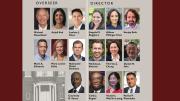 |
| Ronald Kessler |
| Photograph by Stu Rosner |
In on-line biomedical databases, Ronald Kessler ranks as the most widely cited author in psychiatry and psychology. Yet Kessler, professor of health care policy at Harvard Medical School, is neither a psychiatrist nor a psychologist; he’s a sociologist who directed the first (1990-92) and second (2001-03) National Comorbidity Surveys. The more recent study made headlines this year with its finding that fully 50 percent of American adults have had some form of mental disorder. (For those who find that a surprisingly high figure, Kessler explains, “Nobody would be shocked if we found that 99.9 percent of the U.S. population had had a physical illness.”) Another of Kessler’s studies determined that only 14 percent of those who seek help get adequate treatment. “We can treat mental disorders as successfully as diabetes or asthma,” he says. “We can do a good job, but we don’t do a good job.” A specialist in survey methods and statistical analysis, Kessler also heads the $100-million WHO World Mental Health Surveys that are interviewing 250,000 respondents in 30 countries. A Philadelphia native, he graduated from Temple in 1969, earned his Ph.D. at New York University, and taught at Michigan from 1979 to 1996 before coming to Harvard. He lives in Newton with his wife, Vicki, a clinical psychologist, and four teenaged children, and tends to his own mental health by playing squash five days a week and collecting eighteenth-century Pennsylvania furniture. “The typical person with a mental illness takes a decade before getting treatment,” he says. “Everyone is so concerned about the costs of treating mental disorders. But how about the costs of not treating them?”





